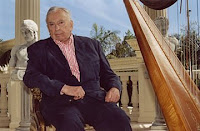 The ancient brouhaha over Gore Vidal's Lincoln (from 1988) has been preserved on the Web and still makes great reading, thanks partly to Vidal's lively baiting and needling of the opposition.
The ancient brouhaha over Gore Vidal's Lincoln (from 1988) has been preserved on the Web and still makes great reading, thanks partly to Vidal's lively baiting and needling of the opposition.To flog my hobby horse again, we are going to see much more of such Vidalism next year because the Vidal of 1988 stands much closer to the academic and intellectual mainstream of 2008 than do (in his term) "the Lincoln hagiographers" of '88 - who have not changed and who will hog the public podium for the duration of the multi-year Bicentennial.
If you appreciate Vidal's witty invective, start here and then follow the thread here. The man who made McPherson, C. Vann Woodward, takes some nice slaps; Harold Holzer is referred to throughout as "the caption writer" or "the publicist"; and big hits are reserved for Richard N. Current, "scholar-squirrel." (Current, like Donald, was a student of the great J.G. Randall.)
A little taste:
For those of us inclined to the Jamesian stricture, a given scene ought to be observed by a single character, who can only know what he knows, which is often less than the reader. ... when it comes to a great mysterious figure like Lincoln, I do not enter his mind. I only show him as those around him saw him at specific times. This rules out hindsight, which is all that a historian, by definition, has; and which people in real life, or in its imitation the novel, can never have.
Nothing that Shakespeare ever invented was to equal Lincoln's invention of himself and, in the process, us. What the Trojan War was to the Greeks, the Civil War is to us. What the wily Ulysses was to the Greeks, the wily Lincoln is to us. I am neither Homer nor Virgil. But it is of those arms that I have tried to sing, and of that man — not plaster saint but towering genius, our nation's haunted and haunting re-creator.
How does a scholar differ from a scholar-squirrel? The squirrel is a careerist who mindlessly gathers little facts for professional reasons. I don't in the least mind this sort of welfare for the "educated" middle class. They must live, too. But when they start working in concert to revise history to suit new political necessities, I reach for my ancient Winchester.
Like so many hagiographers, Current refuses to face the fact that before Lincoln became a saint he was a superb politician. He did nothing without political calculation. He was also a master of telling different people different things, causing no end of trouble for later worshipers who can't deal with all the contradictions.
I am ... reflecting upon the nature of fact as observed in fiction, and, indeed, fiction in fact. That is why the scholar-squirrels fascinate me much more than the scholars because they are like barometers, ever responsive to any change in the national weather. This bad period in American history has been, paradoxically, a good period for American history writing. [...] But pure history, if such a thing could be, is flawed because "history will never reveal to us what connections there are, and at what times, between…." For the novelist it is the imagining of connections that brings life to what was. Finally, "History," as Tolstoy also observed, "would be an excellent thing if only it were true." Perhaps, in the end, truth is best imagined, particularly if it is firmly grounded in the disagreed- as well as agreed-upon facts.



